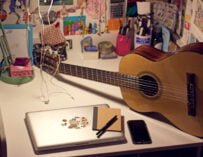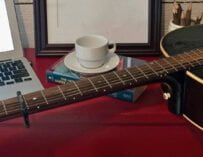
GIYA’s survival kit: “Writing with a guitar always tends to unlock a more honest and personal side of my songwriting”
With her eyes firmly on the world around her, we learn all about the London alt-pop artist’s essential writing gear
London alt-pop singer-songwriter GIYA released her Odd Fish EP back in August and its four tracks continue to capture our imagination. From seductive opener Junk House through to the crepuscular hushed tones of Spin The Record, the EP subtly brings together genres such as folk, pop and hip hop and will strike a chord with fans of Kate Nash and Jamie T. Thematically, these emotionally raw tracks delve into youth culture, love for her hometown, and personal struggles.
Quite rightly, GIYA’s music has drawn praise for its no-nonsense storytelling and ability to connect with listeners on a profound level, but what are some of the key ingredients needed for her songwriting?
I workshop bits of the song in my head by recording loads of voice notes of the bits I like
1. GUITAR
The trusty old servant. Same guitar that I have since I was four, it’s a Breedlove something or other. Never lets me down, and it’s definitely how I wrote most of the new EP. Writing with a guitar always tends to unlock a more honest and personal side of my songwriting, and it’s when a guitar is in my hands that I have had those “fall from the sky” moments, where you open your mouth and out comes this complete song, like it just dropped from the heavens. It happened with Almost Real, my first track, and it happened with Junk House, the third single off my Odd Fish EP. I use my Fender Tele for live predominantly, so it’s nice to write with my acoustic – a bit of variety.
2. VOICE NOTES
I would say I write 60 percent of all my music in my head, before I even pick up an instrument. I can’t read music, and I’m not classically trained in any way, so sometimes instruments can get in the way of the flow of writing at times. So I workshop bits of the song in my head by recording loads of voice notes of the bits I like, and I let them stew for a bit. Doing this allows the lyrics, the melody, and the message of the song to naturally come out. I used to try and finish songs straight away, as soon as I had that initial idea, but that’s something that I don’t force anymore. If it happens, amazing, but this only happens very rarely, and forcing an idea tends to just stunt it. I often find this method allows me the freedom to make songs in bits and allows creativity to come when it comes. An essential!

GIYA: “I think of songwriting as a muscle that you need to keep active, even if just for five minutes a day.”
3. COLLABORATORS
Collaborating with other people is how I get out of writing ruts, which happen as and when they please. I could be in a spot where I think everything I write is terrible and subscribe to the fact that maybe I just peaked in my teens. But often hearing somebody else’s creativity and channel of thought can trigger something that was lying stubbornly dormant in your head, and it feels like this chain reaction of explosions in your head, a sea of unearthed ideas. It’s always been my cheat code of getting out of my head, and back to the song and the story; you just go with the flow a lot more with other people in the room as everyone is pulling the song along in tandem as you work towards eureka. Collaboration is always your friend.
4. DRUM BREAK
Bit of a cheat code, but for some reason a drum break sparks so many ideas for me. I think it’s the fact you can take it literally anywhere, it provides a great canvas to spark ideas and start building melodies. I’m a big lover of the bass too, and writing with just drums and bass has provided the platform for creating some of my favourite tunes (4 Once).
5. DFTLU
“Don’t forget to look up,” is a phrase I try and remember everywhere I go. To look at what is going on around you in everyday life. The writer Fran Lebowitz says that walking around the city is entertaining enough, and there is so much going on all the time, that can be such amazing inspiration – whether it’s one isolated incident mental enough to write about, or just a continued and collective improved understanding of the time and space we live and coexist in. Trying not to live vicariously through your phone, seeing the life that people are portraying, but look at the lives that people really have. They’re very different things, and the truth is what’s going on around us in our day-to-day lives is far more honest.
6. USE THE MUSCLE
There are many different analogies that people have used to describe songwriting. I really like the analogy of surfing and catching a wave, because it definitely feels similar. I think of songwriting as a muscle that you need to keep active, even if just for five minutes a day, to have those moments where you give into the creative idea and run with it a bit. If you don’t use it, eventually it won’t perform in the way you want, or the way you know it can. Trying to write as much as possible will probably always be the number one way to maintain a good songwriting spell, or get out of a rut… It seems obvious but often the hardest thing to do, for me.
Odd Fish is out now. For details of all upcoming gigs, check out GIYA’s Facebook page at facebook.com/giyamoosic
Read more Songwriting Survival Kits

































Related Articles